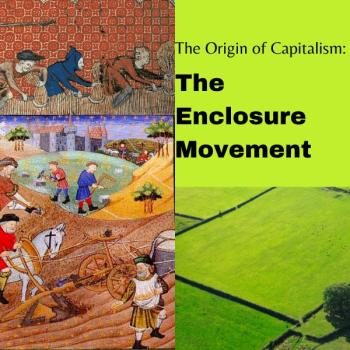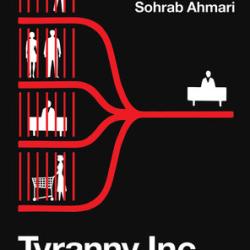
The year of the Lord’s favor – that’s what Luke says Jesus preached in Nazareth to begin his public ministry. He was reading from a scroll of the prophet Isaiah, and both Isaiah and Jesus were referring to the Jubilee Year. That’s the 50th year, when those who had increased their wealth and accumulated property (through foreclosures) and even persons (as debt slaves) were to forgive debts, free slaves, and return ancestral lands to their original possessors. After 49 years of wealth concentration, Israel’s economy would find a new balance. By divine fiat this Year of the Lord’s Favor would reverse an economy’s natural tendency toward destabilizing inequality.
That’s the way it was supposed to work. It hardly ever did. Israel had improved a system that had been in play in nearby cultures for close to two millennia – in theory. By stipulating a Year of the Lord’s Favor every 50 years, Israel should have avoided the need for a strong ruler to declare debt forgiveness. In practice the Year of the Lord’s Favor had to wait for the rare governor who was both good and strong. Nehemiah may have been the only one. (Nehemiah 5:1-13)
In contrast, debt forgiveness appears many times on ancient Near Eastern clay tablets and stone monuments. That includes the famous Rosetta Stone. And that brings up the issue of this essay: How did the modern world come to be this:
- so uninterested in large-scale debt forgiveness that school children could learn about the Rosetta Stone without learning what it said,
- disinclined to believe that anything like a Year of the Lord’s Favor ever happened,
- convinced that without a nearly sacrosanct debt regimen an economy couldn’t survive?
What was going on in the early Church as the surrounding world rejected the ancient tradition of debt forgiveness?
Debt and the Year of the Lord’s Favor
An earlier post on debt forgiveness followed Michael Hudson on debt in the ancient world. When kings canceled a large class of debts, it stabilized economies, brought them back to a pre-existing, more balanced condition. Hudson traces the downward trajectory of debt forgiveness in “… And Forgive Them Their Debts.” As economies became monetized, private holders of wealth competed with kings in the business of lending. These oligarchs resisted royal proclamations of debt forgiveness. In time they became powerful enough to ignore such an edict entirely or assassinate the ruler who proclaimed it.
Israel’s kings arrived on the scene as this trend toward privatizing debt gained prominence. They were weaker than most, often subject to foreign powers. Even without that, most of them pursued the interests of wealthy creditors and their own wealth. Authors and revisers of Jewish Scriptures, especially after the Babylonian Exile, tried to revive the tradition of forgiving debt. They transformed, in Hudson’s words, “Near Eastern traditions of economic renewal into a Yahwistic religious covenant….” (P. 181-182) The books of Leviticus and Deuteronomy spelled out provisions of this covenant. To the residents of post-Exile Judea, a prophet in the tradition of Isaiah heralded the news:
The spirit of the Lord God is upon me, because the Lord has anointed me; he has sent me to bring good news to the oppressed, to bind up the brokenhearted, to proclaim liberty to the captives and release to the prisoners; to proclaim the year of the Lord’s favor. (Isaiah 61:1-2)
Jesus begins his ministry, as Luke records it, by repeating that Isaianic call. Debt features prominently in many parables. Jesus even taught his disciples to pray, “Forgive us our sins, for we ourselves forgive everyone in debt to us.” (Luke 11:4)
What happened after Jesus?
History’s tide was turning against poor debtors in favor of an increasingly powerful creditor class. Hudson says the world’s Roman overlords gave debt the sacrosanct status that they mostly have today. Currents in Jesus’ smaller world aligned well enough with Rome’s priorities. Shortly before Jesus’ time, Rabbi Hillel allowed creditors to get around the biblical precept of loan forgiveness. It seems that the “Year of the Lord’s Favor” represented a program destined for irrelevance, no matter what Jesus said or did.
Besides the words of Jesus, the New Testament has very little to say about debt in the literal, monetary sense. Instead the language of debt begins to serve the infant Church’s theological and spiritual concerns. A good example comes from the Letter to the Colossians:
[Christ] brought you to life along with him, having forgiven us all our transgressions; obliterating the bond against us, with its legal claims … nailing it to the cross. (Col 2:13-14)
This spiritualizing tendency also shows up in the Gospels as evangelists commented on Jesus’ stories. In Matthew Jesus tells about a master financier who forgives the huge debt of one of his agents. That servant then finds an underling who owes him a much smaller amount. Grabbing him by the throat he demands payment of the loan. The master hears about this and reverses his earlier decision. He hands the “unmerciful servant” over to torturers until he pays the entire amount. Scholars like William Herzog (Parables as Subversive Speech, Chapter 8), consider the parable’s conclusion to be the evangelist’s commentary:
So will my heavenly Father do to you unless each of you forgives his brother from his heart. (Matthew 18:35)
Matthew’s “moral of the story” is not about forgiving a loan of money.
Redemption, Ransom in the Old Testament
Jesus is our Redeemer. Jesus’ blood on the cross ransomed us from the devil. Redeeming and ransoming are actions in the world of finance. The Bible uses these terms to describe economic and spiritual realities. But the economic use occurs only in the Old Testament.
Metaphorical, but still not spiritual, meanings for redemption appear also in the Old Testament. For example, redemption could mean buying back the entire people of Israel from slavery in Egypt. Or it could mean rescue from exile in Babylon. Or saving an individual from his enemies or even from death:
- 1 Chronicles 17:221. “Is there, like your people Israel, whom you redeemed from Egypt, another nation on earth whom a god went to redeem as his people?”
- Micah 4:10. “To Babylon shall you go, there shall you be rescued. There shall the LORD redeem you from the hand of your enemies.”
- Psalm 69:19. “Come and ransom my life; because of my enemies redeem me”
- Psalm 49:16. “But God will redeem my life, will take me from the power of Sheol.”
Redemption also gets a spiritual meaning:
- Psalms 130:8. “And God will redeem Israel from all their sins.”
But the first meaning of redemption in the Old Testament refers to a literal financial transaction. It was the buying back of a family’s ancestral land that has been sold to pay off otherwise unpayable debts. A relative could “redeem” the land and keep it in the original family.
- Leviticus 25:25. When one of your countrymen is reduced to poverty and has to sell some of his property, his closest relative, who has the right to redeem it, may go and buy back what his kinsman has sold.”
This kind of redemption shows up as an important detail in one of my favorite Bible stories:
The story of Ruth
Ruth is a foreigner who becomes part of the Israelite people and an ancestor of Israel’s beloved King David. She and her Israelite mother-in-law Naomi have both become widows in Ruth’s home country, Moab. Ruth joins Naomi in her return to Israel and her ancestral property.
Unable by themselves to farm, they eke out a precarious existence as Ruth follows up the reapers on a relative’s land, gleaning what the reapers have left behind.
Now Naomi hatches a plan to secure Ruth’s future and her own. Ruth has made a favorable impression on Boaz, who owns the land where Ruth gleans. Naomi instructs Ruth to get cleaned and dressed up and go to the threshing floor. There she finds Boaz sleeping. He has taken on some wine in honor of a hard day’s work. A somewhat unseemly episode follows with the result that Boaz decides to marry Ruth.
Unknown to us until later, Naomi has also decided to sell her ancestral property. Selling ancestral property is generally a last resort of a farmer who can’t pay his debts. He may have had successive years of bad harvests. Naomi is in a similarly desperate situation. It looks like she could use a redeemer.
Marriage laws and redeeming ancestral property: Ruth’s story continues.
There’s a hitch in Boaz’s marriage plans. When a woman’s husband dies, the widow’s next of kin has the right to marry her. (I’m not sure if this right comes before the dead husband’s brothers’ rights. But those brothers are unavailable in this case, besides not being Israelites.) Boaz’s trouble is that he’s not next of kin. Another relative comes before him. He suspects, correctly, that this relative is not interested in a marriage with Ruth. He would have to divide his heirs’ inheritance with sons he sired by her.
Cleverly Boaz negotiates at the city gate, starting with the sale of land. The other relative, who goes nameless in this story, has the first right to “redeem” the land. He’s interested. But, Boaz says, with the land also comes the Moabite Ruth and the obligation to “raise up a family for the departed [Ruth’s dead husband] on his estate.” (Ruth 4:5) That’s a deal breaker. Boaz ends up with new land and a new family, out of which will come King David and eventually, Jesus.
Redemption, Ransom in the New Testament
A search for “redeem” in a Bible concordance yields several New Testament passages, like:
- Luke 2:38. “And coming forward at that very time, [Hannah] gave thanks to God and spoke about the child to all who were awaiting the redemption of Jerusalem.”
- Matthew 20:28. “Just so the Son of Man did not come to be serve but to serve and to give his life [not his money] as a ransom for many.”
- Romans 3:24. “They are justified freely by his grace through the redemption in Christ Jesus.”
- Ephesians 1:7. “In him we have redemption by his blood, the forgiveness of transgressions….”
- Hebrews 9:15. “For this reason he is the mediator of a new covenant. Since a death has taken place for deliverance from transgressions under the first covenant, those who are called may receive the promised eternal inheritance.”
The first and the last of these quotes illustrate the movement in the New Testament’s treatment of the Old Testament theme. In quote #1 the prophetess Hannah speaks about the baby Jesus to those who were “awaiting the redemption of Jerusalem.” To many this redemption meant getting the land promised to Israel out from under the yoke of their Roman occupiers. It’s like that land redemption in Ruth’s story, only a bigger piece of land. Or it’s like the return of the exiles to land taken from them by Babylon.
In quote #5 the Greek word my bible translates “deliverance” is the same as the word the Old Testament uses for the redemption of ancestral land. But here the deliverance is not from debt or oppression but from sin; and the inheritance one receives is not land but eternal life.
What about our temporary life in this world?
Hudson, though a Catholic, doesn’t like what he reads as Christianity’s promise to the poor of the time:
[The poor] had lost their struggle for social equity by the time Augustus was crowned emperor in 29 BC. For debtors, the arrow of time threatened to bring only a deepening poverty. As hopes for worldly reform became gloomier, more eyes turned to the hereafter to await the Millennium. Christianity promised a renewal, but ultimately in an eschatological Day of Judgment to occur at the end of history. (p. 227)
I don’t think his reading is quite accurate. But there’s some truth to it. Other than Jesus’ words, you don’t read about forgiving unpayable debt in the New Testament. Not monetary debt, at least. There is the unpayable debt we owe to God, which Jesus pays for us. Again, other than Jesus’ words, we don’t find freedom for people in debt slavery. Paul urges masters to treat their slaves justly and fairly (Colossians 4:1) and expects slaves to be content:
Were you a slave when you were called? Do not be concerned…. (1 Corinthians 7:21)
Slaves, obey your human masters in everything … knowing that you will receive from the Lord the due payment of the inheritance…. (Colossians 3:22-24)
In New Testament letters unpayable debt and slavery are important themes. But the debt is what we owe to God and slavery is either slavery to sin or to Christ. In contrast, the Old Testament insisted there were times for forgiving literal debts. The hope for freedom from slavery, whether to Egyptians, to Babylonians, or to one’s Hebrew creditors, was not something to put off until until practically forever.
You might conclude that after Jesus the Church set aside the ancient hope of its own Scriptures. That would be a mistake.
Witnessing for the age to come
The early Church did challenge the world. After all, it was that Church, especially in her first three Gospels, that repeated and wrote about Jesus’ challenging words and disruptive deeds. The Gospels did refocus final redemption onto an age to come. But that Year of the Lord’s Favor wasn’t just something to wait for. The Jews’ memory of Yahweh’s past actions, especially in freeing the Hebrew slaves, told them how to act in their present. Similarly, the future age that Christians looked forward to was argument and inspiration for a life that challenged the status quo.
Mark believed his community was living that new age already, if my interpretation (in this post) of a saying of Jesus is correct:
Amen, I say to you, there are some standing here who will not taste death until they see that the Kingdom of God has come in power. (Mark 9:1)
These are words attributed to Jesus, but it’s Mark who wrote them. We have to think what Mark must have meant. By the time Mark wrote, most of those “standing here” would have died. The hope for that promised powerful Kingdom may have seemed unrealistic. But Mark’s community knew a kind of power. It was the power of witness by a life that contradicted what the Roman Empire stood for. A life where children wouldn’t be shooed away from society’s center. (Mark 10:14) A world where adultery is a sin against a woman as much as against a man. (Mark 10:11) Where wealth doesn’t rule either the world or people’s hearts. And where “many that are first will be last, and the last will be first.” (Mark 10:31) The Roman “powers that be” can crucify you, but, Mark says, they can’t dominate you. That’s Kingdom power.
Past, future, present
For Christians and Jews the past (memory of God’s mighty deeds and our sins) or the future (hope for God’s New Age) or both can spur or even require action in the present. That’s the way our story goes, and we can’t opt out of it and still be in the story. Christian lives must reflect God’s gifts and anticipate God’s dawning Kingdom.
The Gospels and letters of the New Testament, with the Law and Prophets of the Old Testament, tell us what that Kingdom is like. But they don’t tell us exactly what shape God’s Kingdom should take in our economic and political lives. (They do tell us that economics and politics are part of the Kingdom story.) Besides the Bible we need the wisdom of the world. We also need the discernment to tell wise from foolish, and I believe the Bible can be of some assistance there.
A future post or two will return to “Cathonomics,” Anthony Annett’s neologism and title of his book. I introduced this author and his intention to apply Catholic social teaching to economics here. Annett’s work outlines ways today’s economy can move in the direction of that Year of the Lord of biblical memory and hope.
Image credit: Lowell Nazarene












